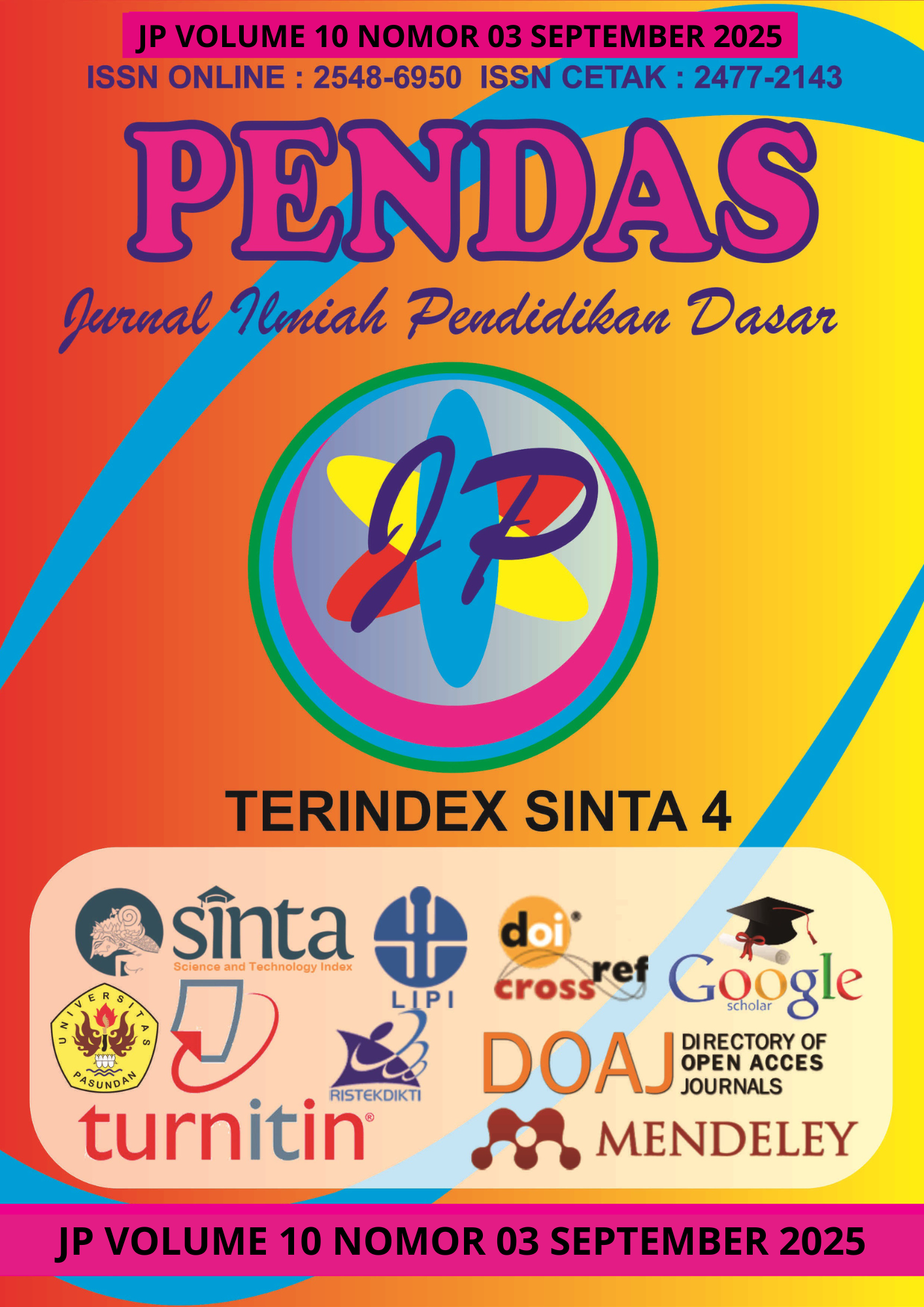UPAYA MENINGKATKAN HASIL BELAJAR PADA MATA PELAJARAN BAHASA INDONESIA MATERI WAWANCARA MELALUI MODEL PROBLEM BASED LEARNING KELAS V UPT SDN SUMURGUNG 1 TUBAN
DOI:
https://doi.org/10.23969/jp.v10i3.29213Keywords:
learning outcomes, problem based learning, interviewsAbstract
This study is intended to improve students' academic achievement in learning Indonesian interview material by applying a problem-based learning model or Problem Based Learning (PBL) in grade V students of SDN Sumurgung 1 Tuban. The research method used is Class Action Research (PTK) which is carried out in 2 cycles. Each cycle includes 1) planning, 2) implementation, 3) observation, and 4) reflection. The subject of the study was 18 students of class VT UPT SDN SDN Sumurgung 1 Tuban. Data collection was carried out through learning outcome tests and observations. Observation data shows that most students face obstacles when studying the field of Indonesian study, especially in interview materials that can have an impact on their learning outcomes. The results of the study show that the implementation of the problem-based learning model can improve students' learning outcomes and show positive responses to learning by using the problem-based learning method. This can be observed from the percentage of students in the first and second stages. The percentage of students in the first phase was 55.5% while the percentage of students in the second stage increased to 94.4%. This shows that the implementation of the problem-based learning model can improve learning outcomes and can be applied as one of the other options for learning methods in elementary schools.
Downloads
References
Aka, K. A. (2016). Model quantum teaching dengan pendekatan cooperative learning untuk meningkatkan kualitas pembelajaran PKn. Pedagogia : Jurnal Pendidikan, 5(1), 35–46.
Aryanthi, K. D., Suwatra, I. I. W., & Suarjana, I. M. (2018). Pengaruh Model Pembelajaran Air Berbantuan Media Gambar Terhadap Hasil Belajar IPS Siswa. Media Komunikasi FPIPS, 17(1), 33–43. https://doi.org/10.23887/mkfis.v17i1.22215
Berliana, D., Ferdiansyah, M., & Syaflin, S. L. (2022). Analisis Gerakan Literasi Sekolah Terhadap Minat Baca Siswa Kelas II di SD Negeri 185 Palembang. Indonesian Recearch Journal on Education, 2(1), 115–121. https://irje.org/index.php/irje
Erawati, D. (2022). Meningkatkan Motivasi dan Hasil Belajar Peserta Didik Melalui Penerapan Model Pembelajaran Problem Based Learning Pada Mata Pelajaran Matematika Kelas 1 SD Negeri 6 Pajar Bulan. Social, Humanities, and Educational Studies (SHES), 5(6), 1086–1093. https://jurnal.uns.ac.id/shes
Falentin, T. A. (2023). Peningkatan Hasil Belajar Bahasa Indonesia pada Kurikulum Merdeka melalui Model Problem Based Learning Peserta Didik Kelas 1 SD Tanjungsari 02 Kota Blitar. Pendas : Jurnal Ilmiah Pendidikan Dasar, 8(1), 2677–2686.
Illahi, G. W., Ekowati, D. W., & Nugraheni, F. (2023). Upaya Peningkatan Hasil Belajar Siswa Mata Pelajaran Bahasa Indonesia Materi Mengenal Suku Kata Dengan Model Problem Based Learning Kelas 1 SDN Purwantoro 1 Malang. Pendas : Jurnal Ilmiah Pendidikan Dasar, 8(1), 721–730. https://doi.org/10.23969/jp.v8i1.7483
Khair, U. (2018). Pembelajaran Bahasa Indonesia dan sastra (BASASTRA) di SD dan MI. AR-RIAYAH : Jurnal Pendidikan Dasar, 2(1), 81.
Mubin, M., & Aryanto, S. J. (2024). Pembelajaran Bahasa Indonesia di Sekolah Dasar. Edu Cendikia: Jurnal Ilmiah Kependidikan, 3(03), 554–559.
Nurmayani, L., Doyan, A., & Verawati, N. N. S. P. (2018). Pengaruh model pembelajaran inkuiri terbimbing terhadap hasil belajar fisika peserta didik. Jurnal Penelitian Pendidikan IPA, 4(2).
Nursabella, M. L., & Astriani, L. (2024). Upaya Meningkatkan Keterampilan Berbicara dalam Teknik Wawancara Siswa Kelas 5 SDN Benda Baru 03. SEMNASFIP.
Pratiwi, N. I., & Syawaluddin, A. (2024). Pembelajaran Sekolah Dasar Meningkatkan Hasil Belajar Siswa Kelas V Melalui Model Pembelajaran Problem Based Learning ( PBL ). Jurnal Pendidikan & Pembelajaran Sekolah Dasar, 3(4), 458–469.
Purnama, S., Rohmadheny, P. S., & Pratiwi, H. (2020). Penelitian Tindakan Kelas Untuk Pendidikan Anak Usia Dini.
Rahmat, E. (2018). Penerapan model pembelajaran problem based learning (PBL) untuk meningkatkan prestasi belajar siswa. Jurnal Penelitian Pendidikan, 18(2), 144–159. https://doi.org/10.17509/jpp.v18i2.12955
Saputri, R., & Yamin, Y. (2022). Pengaruh Model Pembelajaran Role Playing terhadap Hasil Belajar Dongeng pada Siswa Sekolah Dasar. Jurnal Basicedu, 6(4), 7275–7280. https://doi.org/10.31004/basicedu.v6i4.3472
Sugiyanto, R. (2019). Penerapan model problem based learning untuk meningkatkan partisipasi dan hasil belajar IPS-1 Mahasiswa PGSD Universitas Palangka Raya. Indonesian Journal of Educational Science (IJES), 1(2), 89–94. https://doi.org/10.31605/ijes.v1i2.253
Sumarni, S., & Manurung, A. S. (2023). Upaya Peningkatan Hasil Belajar Matematika Melalui Penerapan Model Project Based Learning pada Materi Bangun Ruang. Jurnal Basicedu, 7(5), 2862–2871.
Syamsidah, & Suryani, H. (2018). Buku Model Problem Based Learning (PBL). In Buku. CV. Budi Utama.
Wulandari, R., Timara, A., Sulistri, E., & Sumarli, S. (2021). Pengaruh Model Pembelajaran Role Playing Berbantuan Media Video terhadap Hasil Belajar Kognitif Siswa SD. ORBITA: Jurnal Pendidikan Dan Ilmu Fisika, 7(2), 283–290.
Downloads
Published
Issue
Section
License
Copyright (c) 2025 Pendas : Jurnal Ilmiah Pendidikan Dasar

This work is licensed under a Creative Commons Attribution 4.0 International License.



















